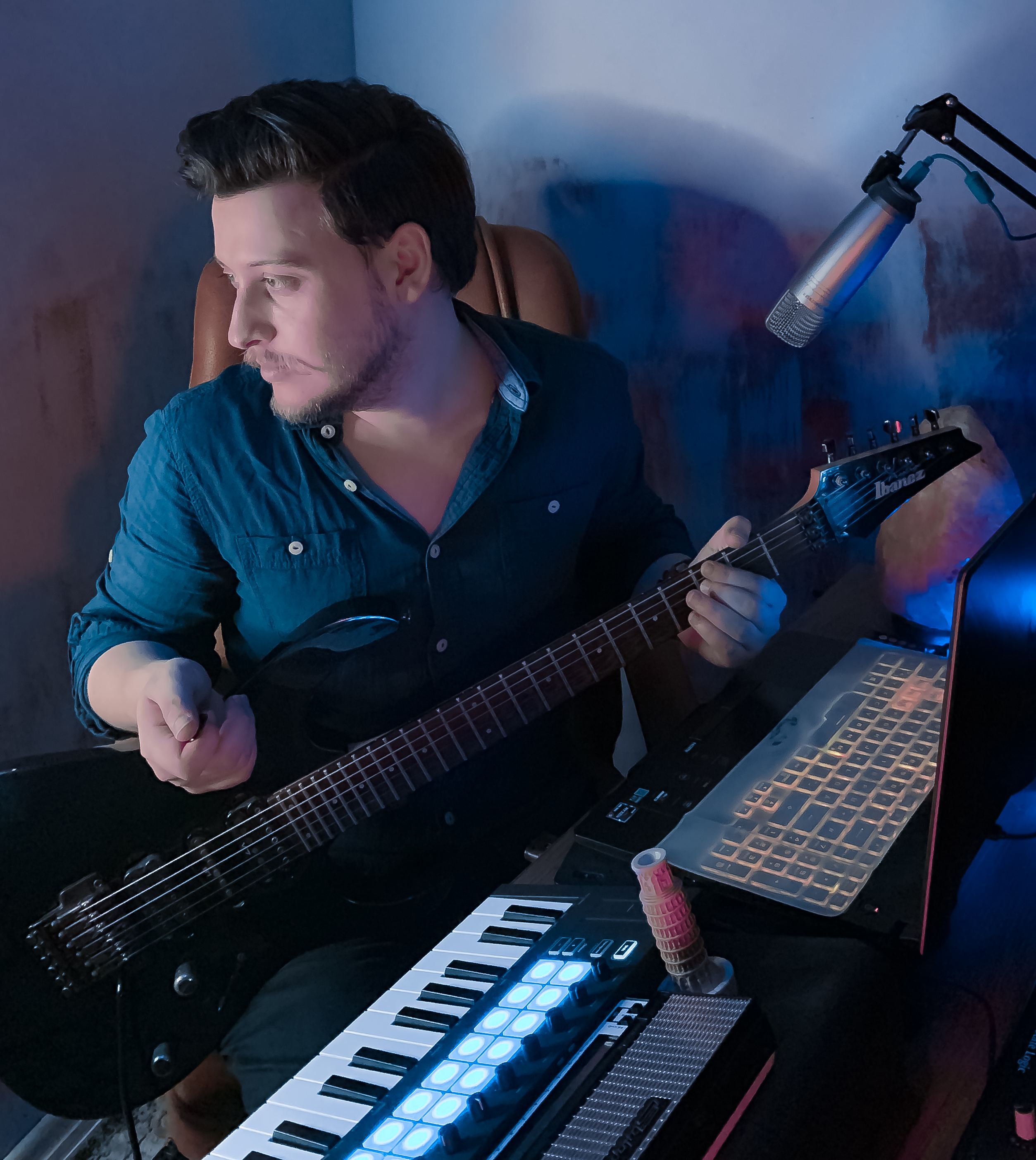Inside the Music: An Interview with Semih Alar
 Natalie Eaton
Natalie EatonTable of contents

In the vast and immersive worlds of video games and films, music plays a crucial role in shaping the experience. It can evoke emotions, set the tone, and even drive the narrative forward. Few understand this art better than Semih Alar, a Turkish composer and music producer whose work has left an indelible mark on both the gaming and film industries. With a unique ability to blend orchestral grandeur, electronic innovation, and ethnic sounds, Semih has crafted soundscapes that are as diverse as they are evocative.
One of his most acclaimed projects is the music for the legendary game Dota 2, where his compositions have added depth and atmosphere to an already iconic universe. His work on Dota 2 earned him the prestigious Jury Prize for Best Orchestral Music at the Film Scoring Academy of Europe in 2023, solidifying his place as a standout composer in the industry.
But Semih’s journey is far from conventional. With a self-taught background, an early love for film scores, and an innovative approach to music production, he has forged a path that is entirely his own.
In this exclusive interview, we delve into Semih’s creative process, his inspirations, and the challenges of composing for video games. We also explore his thoughts on the evolving landscape of game music and what the future holds for this talented composer.
The Dead Don't Die Dota 2 Album on Spotify
The Dead Don't Die Dota 2 Album on Soundcloud
Interviewer: Today, we’re joined by Semih Alar, the composer and sound designer behind some of the most atmospheric and compelling soundtracks in the gaming world. One of his most recent and celebrated works is the music he created for Dota 2. Semih, welcome! Let’s dive right in — how did you approach composing the soundtrack for such a legendary game?
Semih Alar: Thank you! It’s great to be here. Dota 2 is a game with a massive, passionate community, and it comes with its own rich history and lore. When I was brought on board, I knew that the music needed to not only complement the game’s epic scale but also resonate deeply with players who have been living in that world for years. My approach was to blend traditional orchestral elements with more unconventional sounds, like throat singing and didgeridoo, to create a soundscape that feels both familiar and otherworldly.
Interviewer: Throat singing and didgeridoo are not instruments you hear every day in video game music. What inspired you to incorporate those elements into the Dota 2 soundtrack?
Semih Alar: I’ve always been fascinated by how different cultures use music to tell stories and evoke emotions. Throat singing, for instance, has this raw, primal quality that I felt could represent the ancient, mystical aspects of the Dota 2 universe. The didgeridoo, on the other hand, brings a deep, resonant drone that grounds the sound in something almost elemental. Combining these with the more traditional orchestral sounds helped create a soundtrack that feels as vast and complex as the game itself.
Interviewer: The result is certainly unique and has been well-received by the community. Shifting gears a bit, can you tell us about your journey into music? How did you end up becoming a composer, especially for video games?
Semih Alar: My journey into music was a bit unconventional. I started with a brief stint in classical guitar lessons, but the structured approach didn’t resonate with me — I wanted more freedom to explore and experiment. So, I taught myself. Growing up with a love for sci-fi, fantasy, and horror films, I was heavily influenced by film scores, especially those by Danny Elfman. I think it was the score for Sleepy Hollow that really sparked my desire to pursue music as a career. From there, I dove into technology, using computers to shape my sound and experimenting with different musical styles.
Interviewer: It’s fascinating to hear how your early influences shaped your work. Speaking of influences, you’ve mentioned in the past that composers like Bernard Herrmann and Franz Waxman have had a significant impact on you. How do you blend those classic influences with more modern, electronic elements in your compositions?
Semih Alar: Bernard Herrmann and Franz Waxman were masters at creating tension and atmosphere with their scores, which is something I’ve always admired and tried to incorporate into my work. But at the same time, I’m very much a product of the digital age. I love the flexibility and possibilities that electronic music offers. So, I blend the two by using orchestral instruments and techniques to build a strong emotional foundation, then layer in electronic elements to add texture and depth. This combination allows me to create something that feels timeless but also fresh and relevant.
Interviewer: Your ability to mix different genres and sounds is evident in your work. What would you say is the most challenging part of composing for a video game compared to, say, a film?
Semih Alar: The biggest challenge in video game music is creating something that is both dynamic and cohesive. In a film, the music is tied to the visual narrative, with a clear beginning, middle, and end. But in a game, the player controls the pace and direction, so the music needs to adapt to that. It has to enhance the experience without overpowering it, and it has to loop in a way that remains engaging, even after hours of gameplay. This requires a lot of planning and a deep understanding of the game’s mechanics and atmosphere.
Interviewer: Given that, how do you approach the collaborative aspect of game development? How do you ensure that your music aligns with the vision of the game developers?
Semih Alar: Collaboration is key. I spend a lot of time communicating with the game developers, understanding their vision, and discussing how music can enhance it. I believe that music should be a natural extension of the game’s world, so I’m always open to feedback and willing to make adjustments to ensure everything aligns perfectly. It’s not just about creating music that sounds good — it’s about creating music that feels right for that particular game.
Interviewer: That collaborative spirit clearly shows in your work. Looking forward, what kind of projects are you excited about? Are there any particular genres or styles you’re eager to explore further?
Semih Alar: I’m always excited about projects that challenge me to push the boundaries of my creativity. I’ve been exploring more interactive music lately, where the soundtrack changes dynamically based on player actions or in-game events. I’m also interested in delving deeper into traditional ethnic music and finding new ways to blend it with electronic and orchestral elements. Every project is a new adventure, and I’m always on the lookout for something that will push me out of my comfort zone.
Interviewer: It sounds like you have a lot of exciting work ahead of you! Before we wrap up, what advice would you give to aspiring composers who want to break into the video game industry?
Semih Alar: My advice would be to stay curious and keep experimenting. Don’t be afraid to try new things and step outside the traditional boundaries of what you think music should be. Also, build strong relationships with game developers and other creatives — collaboration is crucial in this industry. Finally, be patient and persistent. It’s a tough field, but if you’re passionate about it and keep pushing yourself, you’ll find your place.
Interviewer: Wise words. Thank you so much, Semih, for sharing your insights and experiences with us today. We’re looking forward to hearing more of your incredible work in the future!
Semih Alar: Thank you! It’s been a pleasure talking with you.
Subscribe to my newsletter
Read articles from Natalie Eaton directly inside your inbox. Subscribe to the newsletter, and don't miss out.
Written by

Natalie Eaton
Natalie Eaton
Natalie Eaton is based out of London, England, United Kingdom and works at Perspective Research Services as Associate Director, Head of Qualitative.